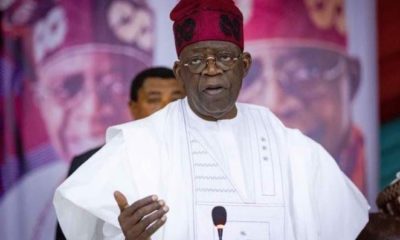Finance
We’ll inherit worst economy in Nigeria’s history – Osinbajo, Nigeria’s VP-elect
ABUJA-The Vice President-elect, Prof. Yemi Osinbajo, has said the incoming Muhammadu Buhari-led government will inherit the worst economy ever in the history of the nation.
Also, a former British Prime Minister, Tony Blair, has advised Buhari to take advantage of the country’s current level of public support for him to take hard decisions.
Osinbajo and Blair spoke during the opening of a two-day Policy Dialogue on the Implementation of the Agenda for Change, which began in Abuja on Wednesday.
Osinbajo put the nation’s local and international debt profile at US$60bn with a 2015 debt-serving bill of N953.6bn, representing 21 per cent of this year’s budget.
He noted that an estimated 110 million out of the nation’s over 170 million population, were living in extreme poverty while the largest chunk of the benefits of the nation’s wealth was going into the pockets of a small percentage of the population.
According to him, the nation’s dwindling oil revenues has made it difficult for 24 of Nigeria’s 36 states to pay salaries.
He said, “We are concerned that our economy is currently in perhaps its worst moment in history. Local and international debts stand at US$ 60bn.
“Our debt servicing bill for 2015 is N953.6bn, 21 per cent of our budget. On account of severely dwindled resources, over two-thirds of the states in Nigeria owe salaries.
“Federal institutions are not in much better shape. Today, the nation borrows to fund recurrent expenditure.”
Osinbajo said the manifesto of the All Progressives Congress “offers a vision of shared prosperity and socio-economic inclusion for all Nigerians that leaves no one behind in the pursuit of a prosperous and fulfilling life.”
According to him, the goal of the policy dialogue is to interrogate the positions and propositions before a wider audience and to launch a robust public conversation on policy directions and priorities that would help inform the incoming administration’s approach in the next four years.
He added that the “forum exemplifies the sort of consultative and consensual approach to policy-making that the APC and the new administration intend to model in office.”
The Vice President-elect also declared that the dialogue intended to explore a wide range of policy priorities including the diversification of the economy in the wake of dwindling oil revenues.
To achieve this, he said, the administration would engender job-led growth through the revitalisation of the agricultural sector in pursuit of job creation and food security, improving the regulatory frameworks in the most strategic sphere of economic activity.
Blair, who was represented by a former Secretary of State for Trade and Industry, Mr. Peter Mandelson, explained that with the current state of affairs, the task ahead of the incoming administration was indeed a daunting one.
Drawing from the experiences of the Labour Party in Britain, Blair said the first rule of governance “is be true to your word; be true to your mandate.”
He urged the Buhari-led administration not to be afraid to take hard decisions but said it must remain mindful of the timing of such decisions.
Blair also advised the administration not to attempt to do everything at once but to ensure that things were done with proper planning along with a commitment to deliver.
He said, “You will have more goodwill and moral authority to do the difficult things at the beginning of your term than at the end. President (Joko) Widodo of Indonesia was elected in July last year, with huge public support.
“One of the first things he did when he was inaugurated in October was to smash Indonesia’s hugely expensive and inefficient, yet popular fuel subsidy.
“A policy decision which had toppled a previous administration and consistently brought people out on the streets, he decided to do it straight away when he had the authority that was the time.”
This, Blair explained, cushioned the effect of the recent fall in oil prices in the world market on the Indonesian economy.
He also stressed the importance of communication which, he said, was vital in democracy because “it is both the means of convincing people and getting them to keep following you once you are elected.”
“Strategy without communication is like a car without headlights,” he added.
The British politician also stressed the need for the government to focus on priorities and ensure service delivery.
Blair also advised the administration to create a mechanism that would focus on its priorities even in the midst of other challenges.
Earlier in his welcome address, the Director, Policy Research and Strategy Directorate of the APC, Dr. Kayode Fayemi, had said, “The phase of policy conception is over and we are entering the phase of execution, governance and of providing tangible developmental deliverables.
“The challenge of translating ideas into policy and praxis now looms large.
“Given the degree of work that has been put in by the directorate and our well-documented national problems of policy implementation, the focus should now be on evolving an institutional framework to deliver the agenda for change.”
Business
Nigeria pays US$4.9 billion on petrol subsidy in 2024- NNPCL
It was however noted by Biztellers.com.ng, that although subsidy is back in effect, the main reason for that is the increasingly weak state of the Naira and the country’s extreme dependence on products importation. Also unlike the previous subsidy era, where several oil marketers were getting free subsidy refunds for unverified product importation, this subsidy era is witnessing only one importer, the NNPCL, which in effect is the sole receiver of government subsidies.
Yemie ADEOYE
INSPITE of the official position of the Nigerian government that the controversial petrol subsidy is gone for good as announced by the President on assumption of office, the state owned Nigerian National Petroleum Corporation Limited, NNPCL has disclosed that petrol subsidy is still fully operational in Nigeria, although, under a different identity.
Umar Ajiya, Chief Financial Officer at the NNPCL, disclosed that it cost the company a staggering N7.8 trillion (US$4.9) to cover this price gap in the first seven months of 2024.
Rather than simply referring to these claims as subsidies, he stated that the company is merely managing the price difference in petrol imports on behalf of the federation, stressing that this should not be misconstrued as a return to subsidy payments.
![]() This revelation has reignited discussions on whether the NNPC is indirectly offering subsidies, a concept typically defined as selling a product below its cost price.
This revelation has reignited discussions on whether the NNPC is indirectly offering subsidies, a concept typically defined as selling a product below its cost price.
Documents reviewed by Biztellers.com.ng showed that the term “subsidy” was used extensively in official correspondence between the NNPCL and the presidency, particularly in reference to the “shortfall.”
Recall that President Bola Tinubu reportedly approved NNPC’s request to utilize the 2023 final dividends due to the federation to offset these costs.
However, during a media briefing on Monday about the company’s 2023 audited financial statements, Ajiya refuted claims that the NNPC is involved in any subsidy scheme.
Ajiya further disclosed that the Nigerian government owes the NNPC N7.8 trillion ($4.9 billion) in subsidy-related debts for the period from January to July 2024.
In furtherance of his clarification to the News Agency of Nigeria (NAN), Ajiya insisted that no subsidy payments have been made to any marketer in the last nine years, citing the NNPC’s role as the sole importer of petrol under supply contracts.
He said, “In the last eight to nine years, NNPC Ltd. has not paid anyone a dime as a subsidy; no kobo has been disbursed by NNPC Ltd. in the name of subsidy. No marketer has received any payment from us for subsidy.”
“What has been happening is that we have been importing PMS, which has been landing at a specific cost price, and the government tells us to sell it at half price. So the difference between the landing price and that half price is a shortfall.
“And the deal is between the Federation and NNPC Ltd., to reconcile, sometimes they give us money, so there is no money exchanging hands with any marketer in the name of subsidy.”
Ajiya remained silent on how much of the $4.9 billion could have been remitted to the federation account if the NNPC had not been covering the “shortfall.”
It was however noted by Biztellers.com.ng, that although subsidy is back in effect, the main reason for that is the increasingly weak state of the Naira and the country’s extreme dependence on products importation. Also unlike the previous subsidy era, where several oil marketers were getting free subsidy refunds for unverified product importation, this subsidy era is witnessing only one importer, the NNPCL, which in effect is the sole receiver of government subsidies.
Banking
CBN Denies Currency Devaluation

The Central Bank of Nigeria (CBN) has refuted claims of devaluing the.
Earlier reports suggested that the CBN had devalued the Naira, lowering its exchange rate from N631 to the dollar, compared to the previous day’s rate of N461.60 at the Importers and Exporters (I&E) window.
However, the Central Bank of Nigeria (CBN) released a statement on Thursday through its Acting Head of Corporate Communications, Dr. Isa Abdulmumin, categorizing the report as false information.
In the statement titled ‘CBN Has Not Devalued The Naira’, he said the attention of the apex bank was drawn to the news report by an Abuja based newspaper edition of June 1, 2023, titled “CB Devalues Naira To 630/51”.
However, the CBN stated categorically that the news report was replete with outright FALSEHOODS and destabilizing innuendos, ‘reflecting potentially willful ignorance of the said medium as to the workings of the Nigerian Foreign Exchange Market.’
“For the avoidance of doubt, the exchange rate at the Investors’ & Exporters (I&E) window traded this morning (June 1, 2023) at N465/USS1 and has been stable around this rate for a while.
“The public is hereby advised to ignore the news report by Daily Trust in its entirety, as it is speculative and calculated at causing panic in the market,” the CBN spokesman added.
He, therefore, advised media practitioners to verify their facts from the Central Bank of Nigeria before publishing in order not to misinform the public.
Banking
BREAKING: CBN Increases Interest Rate By 0.5%

The interest rate in Nigeria has been raised to 18.5 percent, up by 0.5 percent, from 18 percent where it was pegged in March 2023.
The Central Banks of Nigeria’s (CBN) Monetary Policy Committee (MPC) resolved to this effect at its third meeting of 2023 in Abuja, on Wednesday.
Governor, CBN, Godwin Emefiele, made the disclosure in the communiqué of the MPC’s meeting, thereafter.
While engaging the media at the end of the two-day meeting, Emefiele, said the committee voted to keep the asymmetric corridor at +100 and -700 basis points around the MPR.
In the view of the MPC, rising inflation rate is traceable to the high energy cost and challenges around the supply chain, among others, which lie outside the corridors of the CBN.
Emefiele said, “The current trend in price development would continue to be monitored by the bank with greater collaboration with fiscal authority to address the drivers of inflation.”
Biztellers reports that the CBN had effected six consecutive interest rate increases, which has seen the rate move from 11.5 percent in March 2022 to 18.5 percent in May 2023.






















